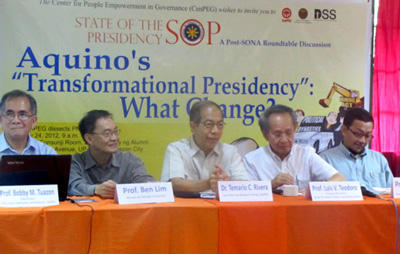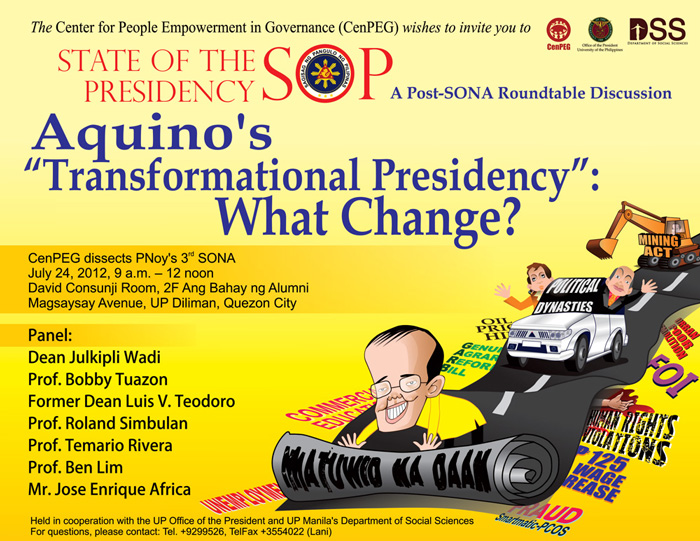Aquino presidency falls short of election promises
CenPEG News
August 2, 2012

SOP panel of speakers, L-R: Fellows Bobby Tuazon, Ben Lim, Temario Rivera, Luis V. Teodoro, and Julkipli Wadi. Not shown: Jose Enrique Africa, Carl Marc Ramota, and CenPEG executive director Evita L. Jimenez, moderator.
The leadership performance of President Benigno S. Aquino III’s administration came under scrutiny during CenPEG’s fourth State of the Presidency (SOP) on July24, 2012. Presentations made by the policy center’s Fellows who assessed the Aquino presidency from policy reform, governance, relations with Congress, foreign policy, political economy, and other angles showed that his first two years fell short of the promises he made to bring about “change” for the country.
Held every year to coincide with the president’s State of the Nation Address (SONA) in July, the 4th SOP was co-sponsored by the Office of the UP President and UP Manila’s department of social sciences. The roundtable discussion was held at Ang Bahay ng Alumni in UP Diliman campus.
Temario Rivera underscored the failure of genuine democracy in the Philippines noting that even under Aquino III no significant reform has been seen in the electoral process, in Congress as a bastion of political clans, as well as in the Party-list system which is now flooded with millionaires. Accountability, he also said, is focused mainly on corruption but not so in other aspects of governance.
To address corruption is not enough when the eradication of poverty and other issues is not being solved at the same time, Rivera added. Rivera, who serves as CenPEG Board vice-chair, is also a professor at the International Christian University in Tokyo.
Jose Enrique Africa cited Aquino’s glowing growth data but underlying it are actually bleak economic realities. While new jobs may have been created, he said, these were of poor quality thus making unemployment and underemployment figures higher than what is claimed by government.
Africa also disputed claims of the increased coverage of PhilHealth saying that public health including hospitals is being commercialized alarmingly making health services more and more inaccessible to the poor. The conditional cash transfer (CCT) program through its “Pantawid Pamilya Project” will not solve poverty either because of lack of jobs, poor education facilities, and other problems, he added.
Africa, a CenPEG Fellow on political economy, is the executive director of Ibon, a non-government economic think tank.
Luis V. Teodoro, another CenPEG Fellow, lamented the fact that while the Philippines had relatively greater access to public information compared with its neighbors in Southeast Asia the enactment of a Freedom of Information (FOI) law could pose restrictions. New restrictions, he said, stem from government’s culture of secrecy and the use of “national security” to justify the non-disclosure of vital information, among other reasons.
He reminded that majority of media killings involved the victims’ pursuit of public information particularly related to corruption and other issues.
Teodoro is a former Dean of the College of Mass Communication, University of the Philippines.
The other speakers were retired UP professor (now with Ateneo) Ben Lim, who talked on Philippines-China relations and territorial disputes; Julkipli Wadi, Dean of the UP Institute of Islamic Studies, who discussed the Mindanao problem and GPH-MILF peace talks; and Bobby Tuazon, director of CenPEG policy studies.
Tuazon argued against Aquino’s support for political dynasties – definitely an anti-reform position – and revealed the trend of the Party-list system coming under the domination of millionaires and traditional politicians. He briefly presented a new CenPEG study on the 15th Congress and the continued expansion of the system of political dynasties in the Philippines particularly under Aquino.
CenPEG executive director Evita L. Jimenez acted as the roundtable discussion moderator while Prof. Carl Marc Ramota, who chairs the DSS, gave the synthesis.
Fellow Atty. Cleto Villacorta opened the roundtable discussion.
The SOP was attended by members of the academe, students, NGOs, representatives of research survey organizations, diplomatic corps, and media. CenPEG News

Click the links below to download the PPTs
- Assessing the PNoy Administration: A Democratic Governance Framework
by Temario Rivera- SONA 2012: Broken Contract, Broken Record
by Jose Enrique Africa- FOI Bill: Issues and Concerns
by Luis V. Teodoro- 15th Congress: Making it Bigger
by Bobby M. Tuazon- Sino-Filipino Relations under the Aquino Regime: So Far
by Ben Lim
- Probing presidential platforms
- Conference calls for people-centered policy actions for Asian development and peace
- WWII 'comfort women' urge visiting Japanese emperor: OFFICIAL GOV’T APOLOGY, UPHOLD TRUTH, and JUST COMPENSATION
- FEARLESS FORECAST (EPISODE II): Comelec will not comply with e-Commerce Law in 2016 elections
- Fearless forecast: Comelec’s non-compliance with the AES law in 2016 (last of 2 parts)
- Fearless forecast: Comelec will not comply with the AES law in 2016
- CenPEG releases travelogue
- Experts: Nuisance bets reflect disillusionment, uneven playing field
- Partylist solon presses for tax cuts
- The True Cost of a Political Campaign
- Management decisions: Based on RA 9369 or purely Comelec’s?
- CenPEG holds 1st roundtable with media on presidential poll results
- Filipino IT can do it!
- FIT4E: The only transparent solution
- Realpolitik in the maritime tiff
- China’s challenge to PH sovereignty
- Choosing the next president
- Fixing the presidency, reforming the state
- New Comelec chair says he’s open to other election technologies
- SC ruling on AES Watch Pabillo and IBP vs Comelec, Smartmatic-TIM
- Comelec must explain P3.2B unliquidated cash advances
- CONGRESS ASKED TO HOLD DEMO ON PCOS HACKING
- 25 Bishops ask poll body to stop midnight deal with Smartmatic
- Pope Francis: reform and conversion
- 2 poll watch coalitions stage rally vs Comelec-Smartmatic midnight deal
- AES Watch questions Comelec-Smartmatic midnight deal
- ASEAN-India: Building Youth Partnerships through Culture and Entrepreneurship
- CenPEG forges research exchange and partnership with Jinan University
- FOI: Bearing fruit or foiled again?
- Remittance with Representation: The right to vote of overseas Filipinos
Center for People Empowewrment in Governance (CenPEG), Philippines. All rights reserved


